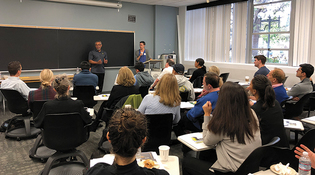 loading
loading
featuresDay of Service: Fostering foster youthIn Los Angeles, helping young people learn how to get a job.  Thalia HendersonFranco Vega, founder and executive director of the RightWay Foundation, spoke to the volunteers about how they could help the foster youth they were about to meet. View full imageIt was billed on the Yale Day of Service website as the Foster Care Awareness Month Event, with a note: “Help foster youth learn how to succeed on the job!” Maybe not the most light-hearted of the Los Angeles Day of Service options. But early on a gray Saturday morning, 35 volunteers showed up on the USC campus, some in well-worn Yale sweatshirts, others in business garb. They were a truly diverse group: all ages, genders, backgrounds, and levels of confidence in how much use they could be to fosters seeking jobs. Nell Rutledge-Leverenz ’03 was elated by the turnout. A writer and film producer, she’s been organizing this event for five years with the RightWay Foundation, where she’s an active member of the board. The seven-year-old foundation’s Operation Emancipation provides extensive training, mental health services, and job opportunities to youths 18 to 24 who are in, or have recently aged out of, the foster system. “Basically what Yale Day does,” Rutledge-Leverenz explained, “is introduce RightWay to a large number of kids, some of whom may join Operation Emancipation, and it gives them a crash course in how to interview and how to keep a job.” Rutledge-Leverenz had met RightWay executive director Franco Vega at an event shortly after he’d founded the organization. When she showed up in his office the following Monday to ask to be on the advisory board, he joked, “Oh, I guess you’re serious about this.” She worked with Sheryl Carter Negash ’82 on several events before launching the Yale Day partnership. “It’s been really exciting,” she said. “This year was the biggest in terms of Yale volunteers. In the past, especially in the beginning, I’ve had to call on personal friends to round out the volunteers, but this year I didn’t even have to send out that call! People came from all over LA, with different experiences to share with the kids.” It wasn’t clear how much the volunteers knew beforehand of the hurdles foster youth face. Statistics are haunting: foster youth are twice as likely to suffer from PTSD as veterans of war. Many become homeless or incarcerated shortly after being emancipated from the system. But the day was anything but grim. The volunteers were randomly divided into teams of three, and each team was assigned to a small classroom of participants. There was plenty of laughter emanating from the groups. In one classroom, a cocky boy who had started out the session bent double, as if to ward off blows, slowly began to unwind and engage. “When you spend the morning with students embarking on their first jobs,” said Ken Goldstein ’84, a tech exec and novelist in his second year of volunteering with the RightWay event, “you’re reminded that listening is the key to conversation. And while you’re supposed to be there with words of advice, you learn more than you teach by simply opening your heart to honest dialogue.” “Last year,” Rutledge-Leverenz remembered, “there were some young group-home women who’d been taken advantage of in a number of pretty horrible ways, and one of them—I’ll never forget this—came running up to me, and she had this big smile, a face I’d never seen before on her, and she said, ‘Guess what! I’m going to make $18 an hour!’ She was so proud.”
The comment period has expired.
|
|